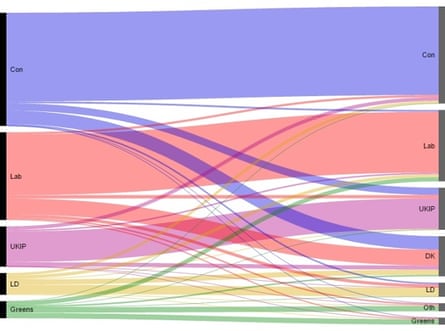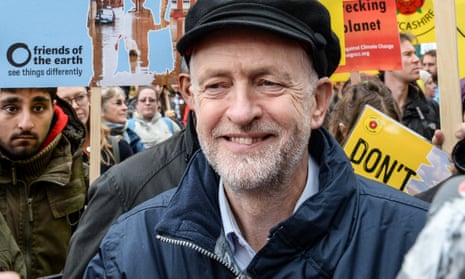Jeremy Corbyn is seen as an unpopular leader across almost all demographic groups and leads a party whose voters are increasingly out of step with majority opinion in the country.
Since the election, Labour has attracted voters from two main sources: the Liberal Democrats and the Greens, many of whom hold views on immigration, defence, welfare and patriotism that are at odds with public opinion.
At the same time, Labour has retained only two-thirds of its own voters, according to a YouGov poll I am releasing on Monday.
The voters who have deserted the party since May hold views reflecting public opinion. The result is that the Labour vote is now composed of staunch loyalists and recent converts; a base that holds positions on immigration, defence, welfare and patriotism which render the party unrepresentative and unelectable.
The flowchart below shows how voters have moved between the political parties in England since May. According to my poll, Labour has retained just 68% of its vote over that period. As the chart shows, these lost Labour voters have found homes with the Conservatives, Greens, Lib Dems and Ukip, or simply don’t know how they will vote. They have been replaced by former Lib Dems or Greens, many of whom strongly approve of Corbyn (43%) but not of the Labour party (13%).

Image: Ian Warren
However, the approval they show is not shared in the country as a whole. Respondents from all demographic groups are united in their strong disapproval of Corbyn as Labour leader. Regardless of gender, age group, social class, region, education age, ethnicity or residential tenure, he is hugely unpopular in the country.
Only 13% of those attracted to Labour since May strongly approve of the party, but 43% of the same voters strongly approve of Corbyn, meaning they may return from whence they came at some point should he disappoint them or be pushed aside.
Voters who have left Labour since May disapprove of Corbyn in equal measure to majority opinion in the country.
Of those that approve of Corbyn, their views on issues are also at odds with majority public opinion. More than half (51%) of all respondents agree with the renewal of Trident, with only 24% disagreeing. There is a consensus in the country in favour of renewing Britain’s nuclear deterrent system regardless of gender, age group, social class and region.
Only supporters of Corbyn, current Labour voters and recent converts want to see Trident scrapped.

Respondents were also asked whether immigration had been good for Britain’s economy or cultural life. Roughly equal proportions of all respondents agree or disagree on this matter.
Younger, better-off voters and those in London are more likely to see the benefits of immigration. Older, less well-off voters and those outside the capital see immigration as a net negative influence on the economy or cultural life. Corbyn supporters appear to only see the benefits. Voters who have moved to Labour since the election feel the same way. Those who have left the party do not – and neither does broader public opinion.
More than three-quarters (76%) of all respondents believe there should be an upper limit on the amount of welfare a household can claim. Here Corbyn’s avowed opposition to a benefits cap puts him at odds not only with broader public opinion but also with Labour supporters and recent converts to the party. Voters who have left the party resemble broader public opinion on this issue; they want a limit on the amount of welfare a household can receive.
More than two-thirds (67%) of all respondents believe patriotism is important and that our politicians should show it whenever they can. Regardless of gender, age, social class or region, there is public consensus on this. But fewer than half (45%) of voters attracted to Labour since May and only 42% of Corbyn supporters feel this way. Fewer than a third (31%) of Green voters from May, many of whom have been attracted to Corbyn’s Labour, think patriotism is important in politicians. Voters who left the party disagree. So does broader public opinion – they want their leaders to be patriotic and to show they are.
In summary, the poll shows the depth and breadth of opposition to Corbyn as Labour leader and the policies and issues he represents. The party is winning tenuous support from former Lib Dems and Greens because of Corbyn, while simultaneously losing support from voters who best reflect public opinion. In so doing it is choosing to represent a dwindling section of the electorate that not only does not reflect the breadth of public opinion but is blissfully unconcerned by it.
Should Corbyn fall on his sword it is more than likely those voters who have recently attached themselves to the party will drift away again, leaving Labour with the 68% it has retained from May. By that point it will have so alienated itself from public opinion as to be considered unelectable by those voters who would quite like a bit of economic security and competence. The third of voters it has lost may well choose to permanently close the door on any return. All of which slowly and inexorably sends a great political institution towards its unfortunate but inevitable death.
Methodology: total sample size was 7,412 British adults. Fieldwork was undertaken by YouGov between 18-23 November. The survey was carried out online. The figures have been weighted and are representative of all British adults (aged 18+). YouGov provided Ian Warren with the raw data, and all analysis has been undertaken by Warren using this data. Data provided in this release refers to English adults only. Tables can be downloaded here.
Ian Warren is the director of Election Data, a consultancy specialising in election analysis, cartography and demographic segmentation. He has worked for all of the main parties in one form or another and worked in Labour HQ during the 2015 general election campaign.

Comments (…)
Sign in or create your Guardian account to join the discussion